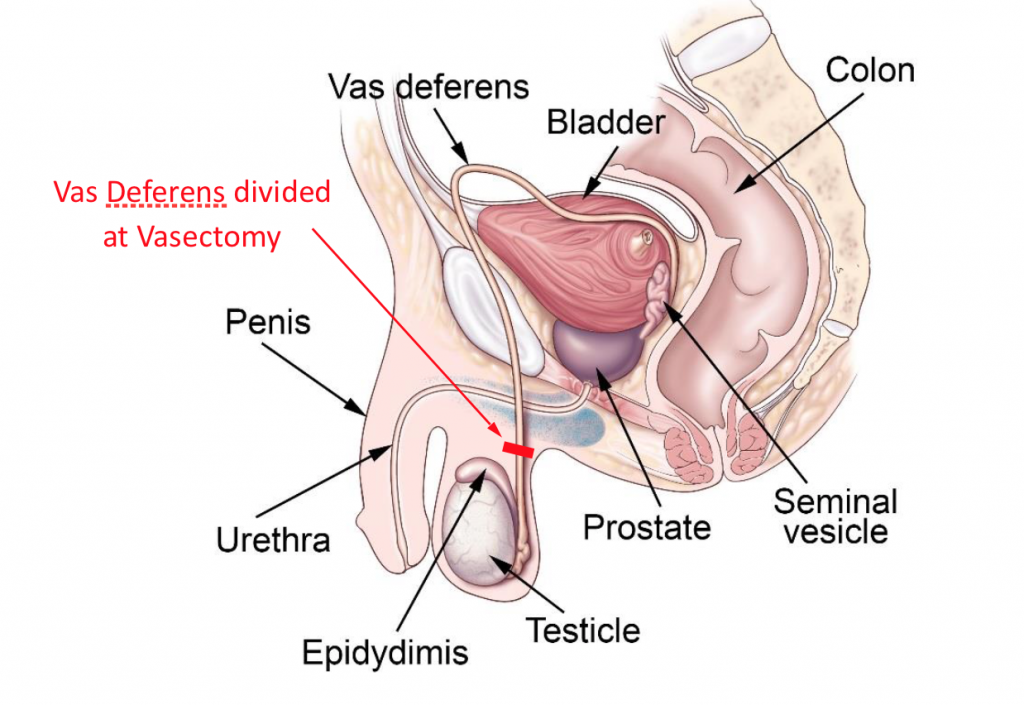Introduction
A vasectomy is a procedure to cause sterilisation in a male. The vas deferens is a tube which carries sperm from the testicles where it is made to the penis during ejaculation. Sperm takes up only a small volume of the ejaculation fluid and semen will continue to be ejaculated after a vasectomy. During a vasectomy the vas deferens is cut, divided and tied to prevent sperm entering into the urethra/penis and so prevent fertilization of a female through sexual intercourse. Vasectomy is a very safe from of contraception.

During the consultation
Your Doctor will take a history and explain the procedure of the vasectomy and possible complications which can occur. You will be examined to ensure the Doctor can feel the vas deferens. Many surgeons perform vasectomies under a general anaesthetic and some prefer a local anaesthetic.
You may be offered an information sheet to remind you of the information given to you at the initial consultation.
After your surgery
You will not be sterile straight away and will require a semen analysis. It takes a number of ejaculations for the sperm to be cleared after your surgery so appropriate contraceptive measures need to be taken until you receive clearance from your doctor. It is recommended that you perform a semen analysis after approximately 25 ejaculations following your surgery.
Risks and Complications
The surgery is safe.
Some risks are those seen in many types of surgery and include:
1. Infection – of the wound or the testicles – may require antibiotics
2. Bleeding – there may be some bruising of the scrotum but a haematoma may also occur
Risks specific to a vasectomy:
- Pain – early after surgery and late (chronic, potentially after several years or longer – this may be related to a sperm granuloma which may present as a small nodule at the site of the surgery
- The two ends of the vas deferens can regrow and rejoin – this is uncommon but can occur. This is known as recannilisation.
- Immune reaction to sperm: A side effect of the operation is that by destroying the excess sperm in the testicles, the body starts producing antibodies against the sperm. Antibodies are special chemical elements made by the body to defend itself against foreign organisms. These antibodies can cling to the sperm and make them useless.
- Some researchers have linked vasectomies to a higher risk of developing prostate cancer and heart disease. Overall, recent research and the current opinion suggests no increased risk.
Recovery after surgery
- You may experience some swelling and bruising – supportive underwear may be beneficial
- Pain and discomfort – Paracetamol is usually sufficient.
- Avoid vigorous exercise and lifting heavy objects for a week.
- You may resume sexual intercourse when you feel free of discomfort, but remember that you need to take appropriate contraceptive measured until you have a negative semen analy
When to contact your surgeon
Contact your surgeon (or present yourself at your nearest Accident and Emergency Department) if you have :
- Fever (temperature more than 38.5 ∞C) or chills
- Increasing swelling of the scrotum
- Increasing pain
- Heavy bleeding form the incision
- Any other concerns you may have
Collections of semen analysis:
Do not ejaculate for 3 to 4 days prior to collecting the specimen
Collect the entire specimen by masturbating into the container. Do not use any lubricants, interrupted intercourse or take the collection from a condom.
It is best to deliver the specimen as fresh as possible after collection to the pathology laboratory. It is important to label your jar “post vasectomy”, with your name and date of birth.
Please contact our office to inform us you have submitted the sample and we will chase up the result and contact you. Men perform the semen analysis at various times after their surgery so it is best to let us know when you submit your specimen.
You may require a second collection depending on the result of the first specimen.
Until you are given clearance you need to take appropriate contraceptive measure as your partner may still become pregnant.
Resources
An excellent source of information regarding a Vasectomy:

